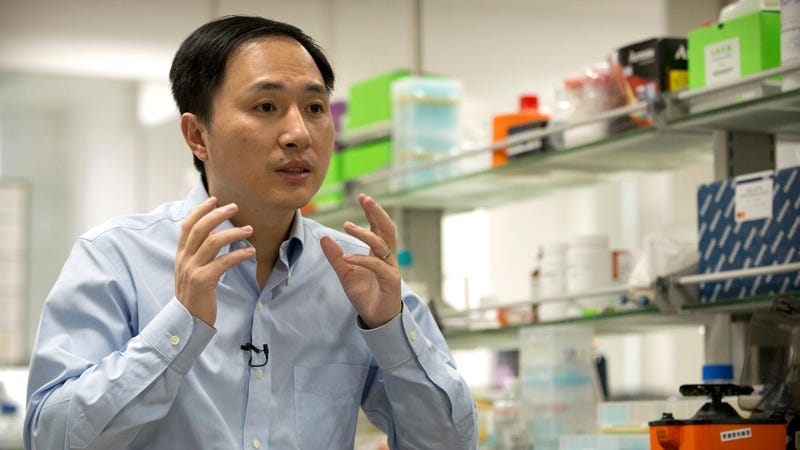 He Jiankui.Image: AP
He Jiankui.Image: AP
A project claiming to have produced the world’s first gene-edited babies has been stopped by the Chinese government, which is declaring the work of scientist He Jiankui as being both unlawful and unethical, according to the Associated Press.
The world learned of He’s experiment earlier this week, though we’re still waiting to see outside scientific confirmation of his assertions. In Hong Kong yesterday, the scientist claimed that he used the CRISPR/cas9 gene-editing tool to modify human embryos, but he made no apologies, saying he was “proud” of the work. The resulting twins, born earlier this month to an unknown couple, are now supposedly immune to HIV.

Rogue Scientist Defends Gene-Edited Babies—and Reveals a Second Pregnancy
Speaking at a genetics conference in Hong Kong earlier today, embattled Chinese scientist He…
Read more Read
This news was greeted with almost universal condemnation, with most mainstream scientists and ethicists complaining that He violated established scientific and ethics standards, among other complaints. He is being accused of unduly experimenting on humans with an unproven and potentially unsafe technology.
On Tuesday, China ordered a “thorough investigation” into the project, but as the Associated Press is reporting today, the government has now taken the added step of shutting down the work until further notice. Speaking to CCTV state television, China’s vice minister of science and technology, Xu Nanping, said the government is strongly opposed to the project. Xu said the experiment “crossed the line of morality and ethics adhered to by the academic community and was shocking and unacceptable,” as reported by AP.
No further details were given, nor did the minister explain what might happen to He and his associates in the days and weeks ahead.
China’s response to this incident could set an important precedent for a country accused of being the Wild West of biomedical research. No doubt, China has been at the forefront of gene-editing research for a few years now. Scientists there created the world’s first gene-edited human embryo and the first cloned monkeys, as two examples. Critics have complained that these achievements are the product of China’s lax regulatory structure, as compared to the situation in the U.S. or Europe.
Those accusations aside, He’s project appears to be the work of an unsupervised lab that took great pains to avoid proper channels, such as failing to file the clinical trial to the country’s registry until early November, which was around the same time the twin girls were born. Furthermore, Chinese scientists have rushed to condemn He’s work. In a joint statement published earlier this week, the Genetics Society of China and the Chinese Society for Stem Cell Research said they “strongly condemn” the project for its “extreme irresponsibility, both scientifically and ethically.” And as VOA reports, over 300 scientists, both from China and abroad, have signed a petition questioning the necessity of the work.
This incident is certainly a teachable moment—though hopefully not at the expense of these twin girls, whose future health remains unknown.
[Associated Press]
Share This Story